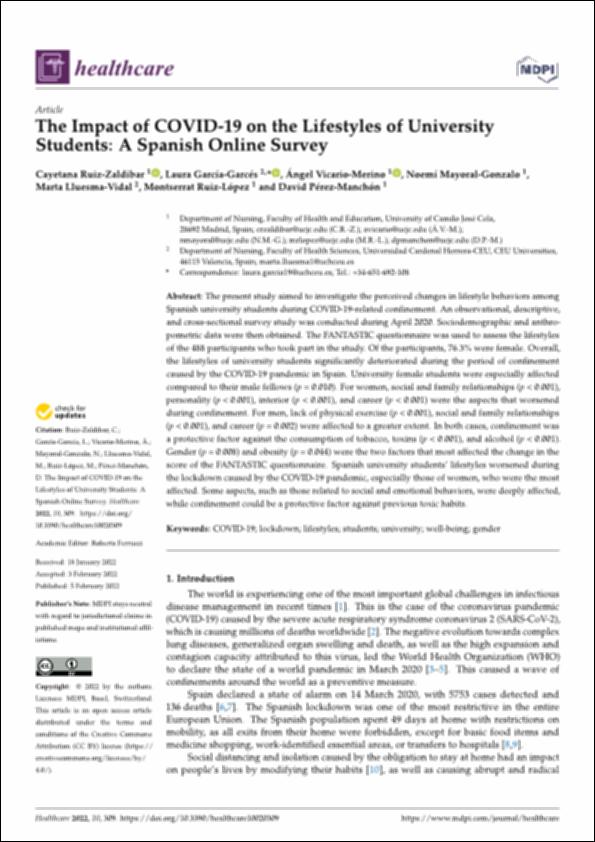Please use this identifier to cite or link to this item:
http://hdl.handle.net/10637/14210The impact of COVID-19 on the lifestyles of university students: a Spanish online survey
| Title: | The impact of COVID-19 on the lifestyles of university students: a Spanish online survey |
| Authors : | Ruiz Zaldibar, Cayetana García Garcés, Laura Vicario Merino, Ángel Mayoral Gonzalo, Noemí Lluesma Vidal, Marta Ruiz López, Montserrat Pérez Manchón, David |
| Keywords: | Estudiantes universitarios - Calidad de vida.; College students - Quality of life.; COVID-19 Pandemic, 2020-; Lockdown (Medical policy); Hemodiálisis - Pacientes - Calidad de vida.; Hemodialysis - Patients - Quality of life.; Confinamiento (Política sanitaria); Pandemia de la Covid-19, 2020- |
| Publisher: | MDPI |
| Citation: | Ruiz-Zaldibar, C., García-Garcés, L., Vicario-Merino, Á., Mayoral-Gonzalo, N., Lluesma-Vidal, M., Ruiz-López, M. & Pérez-Manchón, D. (2022). The impact of COVID-19 on the lifestyles of university students: a Spanish online survey. Healthcare, vol. 10, i. 2 (05 feb.), art. 309. DOI: https://doi.org/10.3390/healthcare10020309 |
| Abstract: | The present study aimed to investigate the perceived changes in lifestyle behaviors among Spanish university students during COVID-19-related confinement. An observational, descriptive, and cross-sectional survey study was conducted during April 2020. Sociodemographic and anthropometric data were then obtained. The FANTASTIC questionnaire was used to assess the lifestyles of the 488 participants who took part in the study. Of the participants, 76.3% were female. Overall, the lifestyles of university students significantly deteriorated during the period of confinement caused by the COVID-19 pandemic in Spain. University female students were especially affected compared to their male fellows (p = 0.010). For women, social and family relationships (p < 0.001), personality (p < 0.001), interior (p < 0.001), and career (p < 0.001) were the aspects that worsened during confinement. For men, lack of physical exercise (p < 0.001), social and family relationships (p < 0.001), and career (p = 0.002) were affected to a greater extent. In both cases, confinement was a protective factor against the consumption of tobacco, toxins (p < 0.001), and alcohol (p < 0.001). Gender (p = 0.008) and obesity (p = 0.044) were the two factors that most affected the change in the score of the FANTASTIC questionnaire. Spanish university students’ lifestyles worsened during the lockdown caused by the COVID-19 pandemic, especially those of women, who were the most affected. Some aspects, such as those related to social and emotional behaviors, were deeply affected, while confinement could be a protective factor against previous toxic habits. |
| Description: | Este artículo se encuentra disponible en la siguiente URL: https://www.mdpi.com/2227-9032/10/2/309 Este artículo pertenece al número especial "Direct and Indirect Effects of the Ongoing COVID-19 Pandemic on Physical and Mental Health". |
| URI: | http://hdl.handle.net/10637/14210 |
| Rights : | http://creativecommons.org/licenses/by/4.0/deed.es |
| ISSN: | 2227-9032 (Electrónico) |
| Language: | es |
| Issue Date: | 5-Feb-2022 |
| Center : | Universidad Cardenal Herrera-CEU |
| Appears in Collections: | Dpto. Enfermería y Fisioterapia |
Items in DSpace are protected by copyright, with all rights reserved, unless otherwise indicated.


